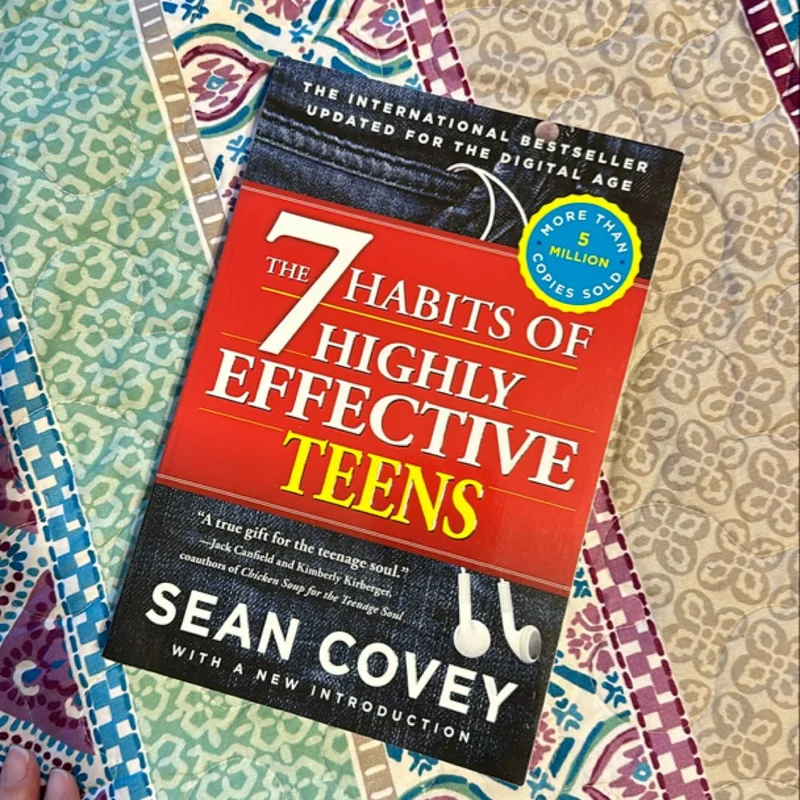Teenage is that tender age, which when molded and corrected will determine the fate of the future life of a person. Covey’s “7 Habits of Effective Teens” is a guide for teenagers which gives them flows towards the main principles of becoming effective.
This guide makes it easier for youths to take charge of their actions, set relevant and proper objectives, as well as enhance their interpersonal communications.
The 7 habits of effective teens is designed on Practical strategies like taking responsibility, listening and communicating skills and achieving personal bright balance. If teens are to incorporate these habits, they are likely to deal with school, personal, and social issues.
In this content, each habit will be explained in detail along with their significance and how the change can be incorporated in real life. No matter if you are a teenager or a parent looking for ways to help your child to avoid pitfalls, these habits will be helpful in order to form lasting positive behavior patterns.
Prepare yourself for a new outlook on life and releasing your potential through the help of these top habits.
The 7 Habits of Effective Teens

1. Be Proactive
The first habit mentioned in the book “7 Habits of Effective Teens” is that of being proactive that puts greater stress on being responsible for your decisions. Unlike what reactive adolescents do, proactive adolescents pay more attention to their responses and behavior. This habit helps teens learn that they are responsible for success at all times no matter what the situation is.
Proactivity enables teenagers to distinguish between what they can do and what they cannot do in this aspect. Lack of response: Sean Covey stresses the need to answer with positivity and purpose in order that teens get better at making right decisions.
Having preventive measures pays one very good dividend as one fosters confidence, accountability, and preparedness to challenges that life throws at one.
This is a great habit among the 7 Habits of Effective Teens and is an initiating step to the overall achievement of the other habits.
Therefore, learning a proactive attitude offers teenagers the ways to obtain what they need and change their lives for the better fulfilling the personal potential and developing meaningful interpersonal relationships.
2. Begin with the End in Mind
The second habit in the “7 habits of effective teens” is the Habit of Beginning with the End in Mind. As noted under employee commitment, this principle helps teens imagine what they want and thus come up with goals. Anything a person is trying to achieve in their academic, personal, and social life is easy to pursue when there is a vision in place.
Sean Covey discusses that the application of the abovementioned habit allows teenagers to keep their eyes on the goal and act in concert with the vision. Teens find mental clarity because they know where to focus and what they want by defining what success is.
According to The 7 Habits of Effective Teens, illustrating the principle of ‘beginning with the end in mind’ creates a purpose and allows people to chart out the course of their lives.
The above habit promotes the process of strategic thinking as well as fosters achievement of goal in order to actualize their dreams. Thus, having a vision, young people are ready to successfully deal with various difficulties, keeping an eye on the outlined goal.
3. Put First Things First
The third habit in “7 Habits for effective Teens” is, “Put First Things First which equates to efficient time management. I have found five procedures, and they are prioritizing an individual or group of people, tasks, or events over what is imperative like school, work, or family.
This habit aids teens in establishing the difference between ‘emergencies’ or things that should be done and ‘priorities,’ or things that should be accomplished, given their importance.
To summarize, students should focus on priorities in order not to postpone and to decrease stress. This of the 7 Habits of Effective Teens teaches teens to be disciplined and to think before they act. For some, it’s not about working harder than before but it is more about working on what needs to be done.
This is such a mindful activity that resides in assisting teens in maintaining harmony and achieving directedness. In this manner, consistency becomes created in what they do and this in turn means changes for the better in school, relationships, extra activities or projects, thus promoting sustainable success and development.
Read More
Books on Self Improvement
10 Books On Changing Your Life
4. Think Win-Win
The fourth habit according to the ‘’7 Habits of Effective Teens’’ is seeking to understand others in order to be understood. According to Covey, those habits are: Win/Win is the attitude and behavior that looks for mutual benefit, not to win the other guy or lose the guy, but both.
This helps teens look for cooperation and respect other people’s opinions in addition to fighting for their wants. Trust is established, relationships are enhanced, and the working climate is fostered all in an organisation.
The 7 Habits of Effective Teens highlights the importance of proactive planning for win-win outcomes in personal and mutual growth. If this habit is maintained among teenagers they will be able to reach solutions to the cultural clashes and earn themselves a profile of respect as fair people.
This habit enables teenagers to balance different competing schedules to ensure they meet commonly desired goals. When people think about it in terms of win-win it goes beyond being a mere relationship concept but one focused on possessing an attitude that there’s enough success to go around.
5. Seek First to Understand, Then to Be Understood
The fifth of the habits in ‘The 7 Habits of Effective Teens’ is to establish a desire to first listen. This habit consists of the practice of listening to other people before even presenting the idea in your mind. Sean Covey additionally writes that people must learn how to understand one another because trust, better communication and fewer misunderstandings are the outcomes of it.
In doing so, teens engage in this habit and develop empathy and respect for people of other opinions.
Out of seven habits of effective teens, this habit is highly important to teach teens how to improve in communication and raise their level of emotional intelligence. Hence, when teenagers try to improve listening skills, they become capable of offering better solutions towards conflicts, better way of communicating and establishing goodwill.
The habit of learning involves domesticating my relationships with family, friends, and my peer group. It also educates teens that communication starts with being understood where their opinions count. From this habit young people can build a strong network that fosters individual and group development.
6. Synergize
The sixth one of the “7 Habits of Effective Teens” is Synergizing which deals with working together with other people. According to Sean Covey synergy means when people combine their strengths then the outcome seen is even better than putting efforts individually.
This habit makes teens to embrace diversity, respect people’s views and be team players.
Integrating it, adolescents can complete tasks more effectively while also gaining knowledge from other persons’ views. Of the 7 Habits of Effective Teens, this habit has the focus on teamwork and learning how to find interdependent solutions. Teenagers learn to relate well, become team players and even develop respect for each other when they learn how to practice synergy.
In this habit it demonstrates that every time progress involves other people be it in a group project, team sports or personal endeavors, how collaboration opens up opportunities for success.
Thus teenagers are capable of fulfilling their goals and personal development by focusing on parameters that are specific to each employee. Synergizing also encourages young people to associate and trust since it prepares them for future encounters in a collaborative world.
7. Sharpen the Saw
The last of the habits outlined in “7 Habits of Effective Teens”is sharpening the saw which is all about balancing and personal restoration. In Sean Covey’s text, he identifies eight small investments that people should undertake daily to maintain great vitality – physical, mental, emotional, and social.
This habit helps teens learn how to refuel their energy and remain productive within their everyday life.
This habit involves such practices as exercise, acquiring new skills, and building friendships.
Overall, among other habits listed in the 7 Habits of Effective Teens, sharpening the saw is a strategy that is to guarantee long term success, protecting from the risk of a teenager’s burnout. It tells teens that the best thing they can do for themselves is to take care of their health while they follow their dreams.
People therefore should balance their lives in order to achieve meaning, work productivity and happiness in their young ages. It also makes it possible for teens to adopt a sustainable behavior that enhances the Personal Development of the teenager. Saw sharpening is a daily exercise of facing and overcoming self-improved techniques necessary in the ever-changing world.
Tips for Practicing the 7 Habits of Effective Teens
1. Start Small and Stay Consistent
If you are about to introduce 7 Habits of Effective Teens, start small as you seek to establish routine procedures. Introduce changes in a package of one or two, for instance the values of being proactive and ensure you follow them.
Gradual implementation only firm up these habits and helps in making them as part and parcel of an individual over time.
2. Set Clear Goals for Each Habit
When writing goals for habits such as “Begin with the End in Mind”, write specific and measurable goals. When you have a positive vision, positive results are achieved since the undertaking is focused on productive goals.
Take your paper and pen and write down your goals to remind yourself of them as well as motivate you when you feel like giving up halfway.
3. Practice Effective Time Management
As he said, “Put first things first” meaning, organize the schedule properly. Put time and task values into a planner or an app to make sure that the tasks that you need to do first are those which are most important.
Make use of the time table by dividing the day into sections and allocate time for studying or learning new information, time for rest or time for other personal events such as eating.
4. Embrace Teamwork and Collaboration
Synergizing entails embracing teamwork. Work in groups to know how other people approach such solutions and to improve your teamwork skills.
Both conversation parties should aim at a win-win transactional relationship.
5. Focus on Self-Care
Saw maintenance implies that a person needs to work on him/ herself constantly. Interact physically, engage in some mindfulness activities as well as indulge in some hobbies in order to be effective.
If you follow the tips I have given you, you will achieve the guidelines of 7 Habits of Effective Teens for teens.
Conclusion
The 7 Habits of Effective Teens are an immensely useful guide to becoming a better person, being successful, and developing close connections. By practicing such habits, teenagers are to become responsible; learn how to prioritize; and, fantastically, establish bonds with people.
Sean Covey’s principles promote the idea in teenagers to be proactive, to look for change and to begin with the end in mind, to design one’s life. Adhering to these habits prepares young people with what they need to do in school, in relationships and future employment disciplines.
The choice in favour of the 7 Habits of Effective Teens opens the opportunities and provides the strong base for becoming successful teen and of course, the amazing life path.
